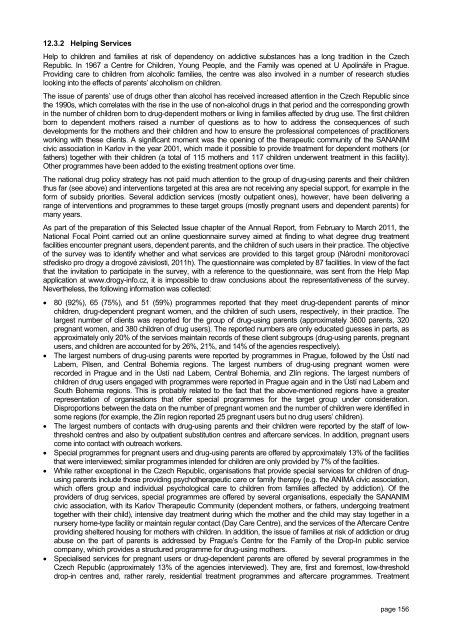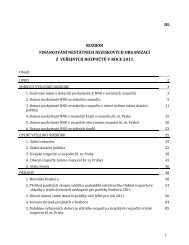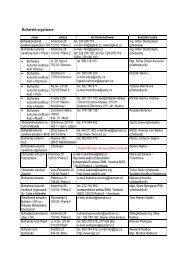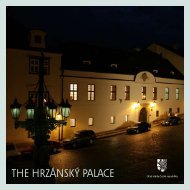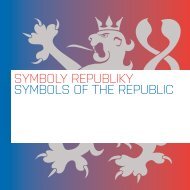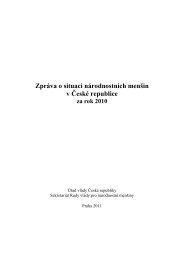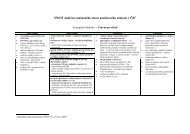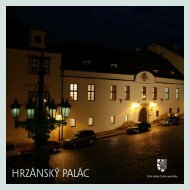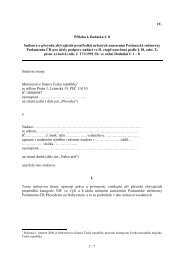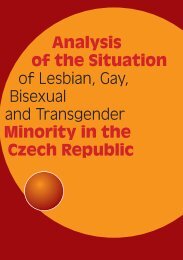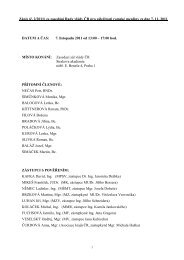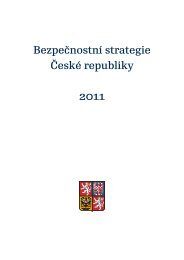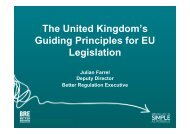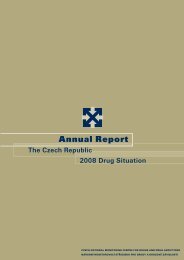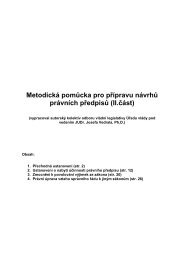The Czech Republic Annual Report 2010 Drug ... - Drogy-info.cz
The Czech Republic Annual Report 2010 Drug ... - Drogy-info.cz
The Czech Republic Annual Report 2010 Drug ... - Drogy-info.cz
You also want an ePaper? Increase the reach of your titles
YUMPU automatically turns print PDFs into web optimized ePapers that Google loves.
12.3.2 Helping Services<br />
Help to children and families at risk of dependency on addictive substances has a long tradition in the <strong>Czech</strong><br />
<strong>Republic</strong>. In 1967 a Centre for Children, Young People, and the Family was opened at U Apolináře in Prague.<br />
Providing care to children from alcoholic families, the centre was also involved in a number of research studies<br />
looking into the effects of parents’ alcoholism on children.<br />
<strong>The</strong> issue of parents’ use of drugs other than alcohol has received increased attention in the <strong>Czech</strong> <strong>Republic</strong> since<br />
the 1990s, which correlates with the rise in the use of non-alcohol drugs in that period and the corresponding growth<br />
in the number of children born to drug-dependent mothers or living in families affected by drug use. <strong>The</strong> first children<br />
born to dependent mothers raised a number of questions as to how to address the consequences of such<br />
developments for the mothers and their children and how to ensure the professional competences of practitioners<br />
working with these clients. A significant moment was the opening of the therapeutic community of the SANANIM<br />
civic association in Karlov in the year 2001, which made it possible to provide treatment for dependent mothers (or<br />
fathers) together with their children (a total of 115 mothers and 117 children underwent treatment in this facility).<br />
Other programmes have been added to the existing treatment options over time.<br />
<strong>The</strong> national drug policy strategy has not paid much attention to the group of drug-using parents and their children<br />
thus far (see above) and interventions targeted at this area are not receiving any special support, for example in the<br />
form of subsidy priorities. Several addiction services (mostly outpatient ones), however, have been delivering a<br />
range of interventions and programmes to these target groups (mostly pregnant users and dependent parents) for<br />
many years.<br />
As part of the preparation of this Selected Issue chapter of the <strong>Annual</strong> <strong>Report</strong>, from February to March 2011, the<br />
National Focal Point carried out an online questionnaire survey aimed at finding to what degree drug treatment<br />
facilities encounter pregnant users, dependent parents, and the children of such users in their practice. <strong>The</strong> objective<br />
of the survey was to identify whether and what services are provided to this target group (Národní monitorovací<br />
středisko pro drogy a drogové závislosti, 2011h). <strong>The</strong> questionnaire was completed by 87 facilities. In view of the fact<br />
that the invitation to participate in the survey, with a reference to the questionnaire, was sent from the Help Map<br />
application at www.drogy-<strong>info</strong>.<strong>cz</strong>, it is impossible to draw conclusions about the representativeness of the survey.<br />
Nevertheless, the following <strong>info</strong>rmation was collected:<br />
80 (92%), 65 (75%), and 51 (59%) programmes reported that they meet drug-dependent parents of minor<br />
children, drug-dependent pregnant women, and the children of such users, respectively, in their practice. <strong>The</strong><br />
largest number of clients was reported for the group of drug-using parents (approximately 3600 parents, 320<br />
pregnant women, and 380 children of drug users). <strong>The</strong> reported numbers are only educated guesses in parts, as<br />
approximately only 20% of the services maintain records of these client subgroups (drug-using parents, pregnant<br />
users, and children are accounted for by 26%, 21%, and 14% of the agencies respectively).<br />
<strong>The</strong> largest numbers of drug-using parents were reported by programmes in Prague, followed by the Ústí nad<br />
Labem, Pilsen, and Central Bohemia regions. <strong>The</strong> largest numbers of drug-using pregnant women were<br />
recorded in Prague and in the Ústí nad Labem, Central Bohemia, and Zlín regions. <strong>The</strong> largest numbers of<br />
children of drug users engaged with programmes were reported in Prague again and in the Ústí nad Labem and<br />
South Bohemia regions. This is probably related to the fact that the above-mentioned regions have a greater<br />
representation of organisations that offer special programmes for the target group under consideration.<br />
Disproportions between the data on the number of pregnant women and the number of children were identified in<br />
some regions (for example, the Zlín region reported 25 pregnant users but no drug users’ children).<br />
<strong>The</strong> largest numbers of contacts with drug-using parents and their children were reported by the staff of lowthreshold<br />
centres and also by outpatient substitution centres and aftercare services. In addition, pregnant users<br />
come into contact with outreach workers.<br />
Special programmes for pregnant users and drug-using parents are offered by approximately 13% of the facilities<br />
that were interviewed; similar programmes intended for children are only provided by 7% of the facilities.<br />
While rather exceptional in the <strong>Czech</strong> <strong>Republic</strong>, organisations that provide special services for children of drugusing<br />
parents include those providing psychotherapeutic care or family therapy (e.g. the ANIMA civic association,<br />
which offers group and individual psychological care to children from families affected by addiction). Of the<br />
providers of drug services, special programmes are offered by several organisations, especially the SANANIM<br />
civic association, with its Karlov <strong>The</strong>rapeutic Community (dependent mothers, or fathers, undergoing treatment<br />
together with their child), intensive day treatment during which the mother and the child may stay together in a<br />
nursery home-type facility or maintain regular contact (Day Care Centre), and the services of the Aftercare Centre<br />
providing sheltered housing for mothers with children. In addition, the issue of families at risk of addiction or drug<br />
abuse on the part of parents is addressed by Prague’s Centre for the Family of the Drop-In public service<br />
company, which provides a structured programme for drug-using mothers.<br />
Specialised services for pregnant users or drug-dependent parents are offered by several programmes in the<br />
<strong>Czech</strong> <strong>Republic</strong> (approximately 13% of the agencies interviewed). <strong>The</strong>y are, first and foremost, low-threshold<br />
drop-in centres and, rather rarely, residential treatment programmes and aftercare programmes. Treatment<br />
page 156


